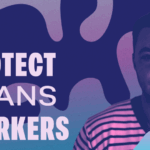
National survey reports widespread harassment and violence in workplaces
Today the CLC and its research partners are releasing the initial findings of a national survey on workplace harassment and violence.
For years, workers and advocates have been drawing attention to the ongoing and widespread issue of harassment and violence at work. However, a shortage of Canadian-specific data made it difficult to know the extent and nature of the problem.
To address this evidence gap, in 2020, the CLC and researchers from the University of Western Ontario and the University of Toronto launched the first National Survey on Harassment and Violence at Work. Nearly 5,000 workers took part in the survey offering a clear snapshot of how workers are experiencing harassment and violence. The initial report, “Harassment and Violence in Canadian Workplaces: It’s [Not] Part of the Job,” was released today.
The results in this report are unsettling:
- 7 in 10 workers have experienced a form of harassment and violence at work.
- Nearly 1 in 2 workers have experienced sexual harassment and violence in the last two years.
- Women, trans, nonbinary, and gender-diverse workers are experiencing higher rates of harassment and violence.
- Indigenous survey respondents experienced significantly higher rates of harassment and violence (79%) and sexual harassment and violence (47.8%).
- Workers with a disability experienced significantly higher rates of harassment and violence.
- Third-parties (such as customers, clients, and patients) and co-workers were the two most commonly reported perpetrators.
- 70% of workers who experienced harassment and violence had to miss work because of the negative effects.
- 88% of workers who experienced harassment and violence were “transferred, suspended, fired, or lost a shift” due to the harassment and violence.
- 1 in 4 who reported said that reporting made the situation worse.
“The Report provides an important and sobering insight into the state of harassment and violence in Canadian workplaces today” said Bea Bruske, President of the Canadian Labour Congress (CLC). “We see this as a wakeup call and as an opportunity to reassess what is and is not working. The results will give us a strong evidence-base to decide what actions we need to take next.”
The survey results tell us that workers are not experiencing harassment and violence the same. Indigenous workers, racialized workers, workers with disabilities, and workers who are a part of the 2SLGBTQI+ community are experiencing different forms and higher rates of harassment and violence.
The survey also found that third party violence from customers, clients, and patients is happening at a startlingly high rate, which means we need to do more to protect our members who work with third parties. This important finding will help unions create targeted prevention strategies to keep workers safer.
“We know there is no one-size-fits-all solution and we are ready to do the work to address harassment and violence in all its forms,” said Bruske. “We are particularly concerned by the results around reporting which shows that too few workers are reporting and those that do are often not satisfied with the outcome. Clearly, the reporting procedures that we have in place today are not working.”
The initial Report will help start conversations with members about what changes they want to see from their unions, employers, and governments. Tackling harassment and violence at work will require a commitment from all three. Canada’s unions look forward to working closely with employers and governments to build harassment free workplaces. The CLC is developing a multi-year plan to address harassment and violence that will include education programs, collective bargaining approaches, and a legislative agenda. Targeted reports will dive into the data in more depth to better understand how marginalized workers are impacted by harassment and violence. These will help develop and implement much-needed strategies to help keep all workers safe.
“We want to thank all of the workers who took part in this survey for sharing their stories and experiences. We know that this is an opportunity to create lasting change and the labour movement will not let this opportunity pass. We are prepared to do what it takes to make work safer for everyone,” said Bruske.








